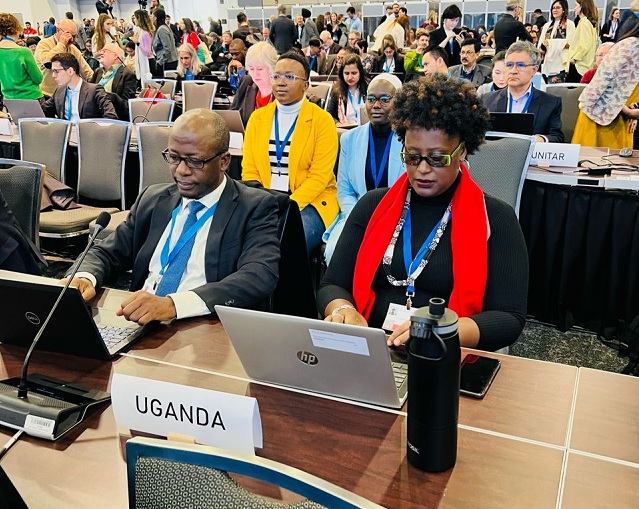
Ottawa, Canada | THE INDEPENDENT | Negotiators from about 175 countries are meeting in the Canadian Capital Ottawa to forge an international treaty to regulate plastics.
The conference in Canada is the fourth in the round of negotiations since the governments backed by scientific evidence agreed to develop an international treaty to clean up plastic pollution that is choking rivers and piling up in landfills.
The negotiators in Canada are expected to advance negotiations so that the Committee can finalize, at its fifth session (INC-5)in November, the text of the instrument. It is hoped the fifth session in Korea will adapt the treaty ready for signing and ratification by countries.
As the negotiations enter the third day, some radical environmentalists are calling on governments to ban plastic manufacturing. That is unlikely to happen given the role of plastics in the global packing industry and some crucial industrial practices.
Inger Andersen, Executive Director of the UN Environment Programme addressed journalists in a virtual media briefing. She said they are seeing convergence in eliminating the uses that are problematic and avoidable.
“We will continue to need plastic for specific uses, such as renewable energy technologies. But there is growing agreement that short-lived and single-use can go,” said Inger Andersen. She said the seventy years of plastics in the world have come with bad lessons to learn.
In March 2022, nations under the United Nations umbrella committed to forging a legally binding treaty by the end of 2024 to end the scourge of plastic pollution. The treaty aims to encompass the full lifecycle of plastics—from their design and production to their disposal or recycling.
Anderson says the treaty should encompass what she described as a full life cycle of plastics. “When I say full lifecycle, it means eliminating that which is unnecessary. Which is short-lived and single-use. And rolling our reuse models where national jurisdictions feel that is appropriate. And producing less plastics as we can,” she explained.
The negotiators have so far discussed three themes including; plastic pollution in the marine environment, approaches to capacity building, financing, and financial mechanisms, and enabling just transition. Uganda has a big representation to the session. Some of the experts there include NEMA’s Executive Director, Barirega Akankwasah.
What progress?
Inger Andersen said they are proud of what has been achieved. “But a job half-done is a job not done. Time is against us – both in terms of finalizing the instrument and how much more the planet can take. As we deliberate, plastic pollution continues to gush into ecosystems,” she said.
She is of the view that moving into the reuse, reduction, and recycling of plastics is critical.
“We have seen progress in the first round of negotiations and that has been critical. There is a text before the negotiators right now. And INC4 will be the place where we hope to see a way forward,” she explained. “We are set to meet for the last time and final time. And INC 5 in Busan. The more progress we make here, the more likely that we will have an agreement that will meet everyone’s concerns son that we can protect humans and ecosystem health”
Jyoti Mathur-Filipp leads the International Negotiating Committee (INC) on plastics. She said they should have significantly advanced text of the internally legally binding instrument.
“Getting it as close as possible to the final agreement that we all want to see at INC5 Busan in the Republic of Korea,” she said.
Over 1300 participants from 175 members are attending the session. Over 2800 participants from 142 Environmental NGOs, 16 intergovernmental organizations, and 22 UN entities are also attending.
“We have brought the world here in Ottawa to beat plastic pollution. And we need to make these seven days count, deliver a text that is as close as possible to the final agreement that we all want to see,” said Mathur-Filipp.
There is an emerging consensus that the instrument should be based on a comprehensive approach that addresses the full life cycle of plastic, including its production, design, and disposal. Like the debate on climate change and fossil fuels, the complexities around the plastic treaty deal with different interests.
The negotiations have revealed deep divisions on how best to tackle the issue. There’s an ongoing debate about whether to focus more on curtailing production or enhancing waste management. This conflict of interest has slowed progress.
Inger Anderson said the issue is that the negotiations are seeking to end plastic pollution including in the marine environment which impacts all of us including those countries which are responsible for producing plastics.
“I completely understand that there can be some frustrations. Bu we have to understand there has to be a world with a broad agreement to encompass everyone and everyone’s economy, ”
From Ottawa, INC-5 will be held in Busan, the Republic of Korea, from 25 November to 2 December 2024. A Diplomatic Conference will follow it where Heads of State will sign the agreement.
****
URN
 The Independent Uganda: You get the Truth we Pay the Price
The Independent Uganda: You get the Truth we Pay the Price



